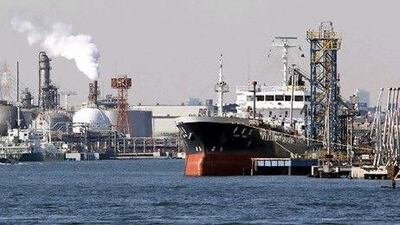Japan's export credit agency is proposing an increase in its budget as it seeks to secure the fossil fuels vital to the country's economy amid a nuclear shutdown.
The agency, Japan Bank for International Cooperation (JBIC),which backs huge power plants throughout the Middle East and has lent billions of dollars to Abu Dhabi National Oil Company (Adnoc), has a key role to play in the wake of the tsunami and earthquake that crippled the Fukushima nuclear power plant last March.
Since the triple meltdown, all but two of Japan's 54 nuclear reactors that once provided up to 30 per cent of its electricity have been shut down, and the economy contracted by 0.7 per cent in the last three months of last year.
"Our role will be more important I think in terms of energy security of Japan," said Hiroshi Kurihara, JBIC's chief representative in Dubai. The budget last year was ¥1.5 trillion (Dh660.4 million), and JBIC is seeking ¥2.5tn this year from the government, which will make its decision this month.
The country is relying increasingly on fossil-fuel imports from the UAE as well as the natural-gas powerhouses of Indonesia, Qatar, Australia and Malaysia.
Japan increased oil imports from the UAE to 301 million barrels last year from 278 million barrels in 2010. With prices for the European benchmark Brent crude topping US$127 a barrel last year, the value of Japan's crude imports from the UAE rose 48.8 per cent, according to the Japan External Trade Organisation.
JBIC, technically the international arm of the Japan Finance Corporation, is scheduled to become independent next month, giving it more flexibility to carry out its mission in backing energy projects that smooth bilateral relations and bring business to companies at home.
Nations such as Japan rely on export credit agencies to fill the gap between how much a project costs and how much private banks are willing or able to lend.
Last March JBIC held $19.4 billion (Dh71.2bn) of Middle Eastern debt that includes financing to build Qatar's liquefied natural gas plants and a Fujairah power plant along with $4.2bn in import loans for Adnoc.
Japan remains one of the few foreign players allowed into Abu Dhabi's closed concessions regime. It holds two small offshore concessions and stakes in two huge offshore joint ventures with Adnoc alongside western majors such as BP, Total and ExxonMobil.
Last year, a Japanese consortium led by Cosmo Oil renewed its contract for a package of offshore fields for a further three decades - and even got an extra field thrown in.
JBIC's loans to Adnoc in 2007 and 2010 - its only ones not earmarked for a specific project in the region - are part of making agreements such as that possible, said Ryutaro Nishizaki, another representative for the agency in Dubai
"Financing for Adnoc is not directly relating to the development of oilfields itself," he said. "Keeping a good relationship with the [national oil companies], such as Adnoc or QP [Qatar Petroleum] or Saudi Aramco, is very important for us to secure the stable supply of natural resources," Mr Nichizaki added.
"I believe Adnoc sees JBIC as a good partner for financing projects, and Adnoc is a very, very important client to us - not just JBIC but also Japan. So there is a win-win situation for both sides."
The Abu Dhabi Marine Areas concession, a contract signed in 1953 between the entities that are today called BP, Total and Japan Oil Development Company, expires in 2018.
"Before that we may consider some support to the renewal of the contract for the company," said Mr Nishizaki. "It is the ultimate goal for Japan itself to continue to have concession rights in Abu Dhabi."
Now JBIC is awaiting the outcome of tenders for Dubai's first private power project and Jordan's planned nuclear reactor. Japanese companies are involved in both bids and JBIC stands ready to back both, especially as the troubles in the euro zone have dried up financing from private banks.
"The availability of financing from the European banks is limited," said Mr Nishizaki. "So, fortunately or unfortunately, our role continues to be very important."
twitter: Follow and share our breaking business news. Follow us

